#dionysus dithyramb
Explore tagged Tumblr posts
Text

Dionysus dithyramb (born twice)
Even though he was born more than twice
22 notes
·
View notes
Text
yet another list of "beautiful" words
to try to include in your next poem/story
Book-bosomed - coined by Sir Walter Scott; means "carrying a book at all times." If you love books, certainly you've been book-bosomed at times in your life.
Caliginous - misty, dark
Dithyramb - a usually short poem in an inspired wild irregular strain. This word comes from the Greek word dithyrambos which was the name for a wild and irregular poem honoring Dionysus, the god of wine, who was often lauded throughout the year during festivals at which poems of this style were read.
Embonpoint - plumpness of person; stoutness
Farinaceous - having a mealy texture or surface
Farouche - marked by shyness and lack of social graces
Florilegium - a volume of writings; an anthology. The word was borrowed into English from a New Latin word that comes from Latin florilegus meaning "culling flowers." Think of a florilegium as a bouquet of writings, specially selected and arranged for your enjoyment.
Goety - black magic or witchcraft in which the assistance of evil spirits is invoked
Lachrymist - one given to weeping
Lamia - a female demon; vampire
Osseous - bony
Phantasmagoria - a bizarre or fantastic combination, collection, or assemblage
Stygian - extremely dark, gloomy, or forbidding
Tenebrous - shut off from the light
Theurgy - the art or technique of compelling or persuading a god or beneficent or supernatural power to do or refrain from doing something
If any of these words make their way into your next poem/story, please tag me, or leave a link in the replies. I would love to read them!
More: Lists of Beautiful Words ⚜ Word Lists
#writing prompt#words#literature#writeblr#spilled ink#poetry#poets on tumblr#writers on tumblr#writing#writing challenge#writing advice#writing reference#writing resources#langblr#studyblr#dark academia#word list#beautiful words
3K notes
·
View notes
Text
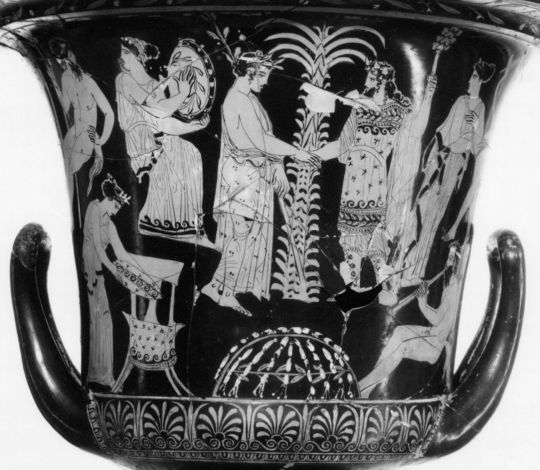
Apollo and Dionysus at Delphi
Attic vase
Fourth century BC.
The State Hermitage Museum, St. Petersburg.
Apollo, with a crown of laurel, is welcomed to Delphi by Dionysus, who is bearded and carrying the thyrsus. Between them is a palm tree, a symbol of Apollo and victory, triumph, peace and eternal life. Beneath them is the Delphic omphalos or navel, center of the world. Behind them is a palm tree, and the other figures are maenads and satyrs, followers of Dionysus.
According to the legends, Apollo entrusted Delphi to his brother Dionysus during winters. Hence during the winter season, only dithyrambs were played in the temple Delphi instead of the usual paeans and the Maenads in turn sang in the honor of Apollo as well.
321 notes
·
View notes
Text
Nevermore is a gothic tragedy. Part I: Classical and Shakespearean Tragedy
This essay assumes that you've read the first season of Nevermore. If you haven't, you'll be eating spoilers.
First of all, a disclaimer: you won't find the term "Gothic tragedy" in theory books, because I just pulled it out of my sleeve. But it seemed appropriate to put it in those terms because, hey, beyond theoretical structuring, genres are also used as a guide to content, and that's kind of what I want to express with this.
Partly because I've noticed that I've called this comic a tragedy on more than one occasion, and talked at length about Lenore and Annabel as gothic characters, but never bothered to delve into these matters, and with the hiatus until (possibly) October, I think it's time to rectify that situation.
But also because I think there are a lot of things in this story that fall into place if you read it under the logic of those genres.
Originally, this was going to be a single essay, but it turns out it took over 2000 fucking words just to explain why it's a fucking tragedy, so I'm going to split this shit in two because I don't want to burn anyone's eyes out.
Tragedy and Types of Tragedy
This is the ridiculously abridged version because this is a really long story, if you want more information on the subject I highly recommend reading Aristotle's Poetics, Nietzsche's The Birth of Tragedy or watching this OSP video for a more proper introduction. If you're interested in Shakespearean tragedy, The Cambridge Shakespeare is a amazing compilation, and here's the essay that talks specifically about what the hell Shakespearean tragedy is.
Tragedy has been linked to the origins of theater as such, found in the festivals dedicated to Dionysus (if you want to know more about the cult of Dionysus, you can watch this video to start), where poetry contests were held, specifically of dithyrambs: lyric compositions dedicated specifically to Dionysus. This later led to the inclusion of an increasingly sophisticated chorus using masks. This was no longer poetry, but the first expressions of theater as we understand it in modern times, at least for Europe and the countries colonized by Europeans.
Nietzsche also points out that tragedy condenses within itself two opposing impulses represented in the gods Apollo and Dionysus, expressed in the terms "Apollonian" and "Dionysian": order, mathematics and music (understood by the Greeks as science) vs. party, debauchery and chaos. The clash between the beautiful and the grotesque (understanding that the "beautiful" can be disturbing and the "grotesque" can be strangely beautiful). This description is not entirely literal, of course, but it must be kept in mind that in order to have the fundamentals of a tragedy, one must have these two elements: order and chaos. A synchronized waltz between the rigid structures and the rupturing.
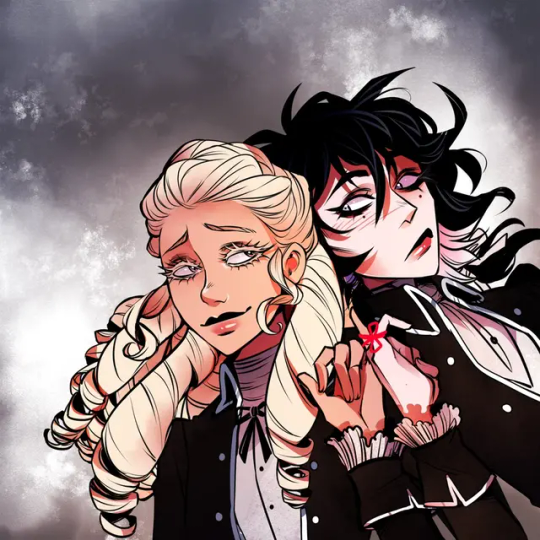
Yes, those two are enough.
Step by step, I think it is important to point out what are the transversal elements to tragedy - classical or Shakespearean - that are present in the comic.
The first important concept that appears on this page is Amarthia. The tragic mistake, the first domino that topples the whole stack, is the specific event that sets tragedy in motion, and we spectators of tragedy can only stare in horror at the situation, knowing that everything that follows will go terribly wrong.
At least as far as its protagonists are concerned, Annabel and Lenore's Amarthia has been said but not seen: the dinner party where Annabel will wear pearls, indicating to Lenore that she is in on the charade. From then on, every step they take will bring them closer to the fate we know: the arrival of both of them in Nevermore. This story ends with them both dead.
And if I had to point out the Amarthia of the comic's topicality, I would dare to say that this is it:
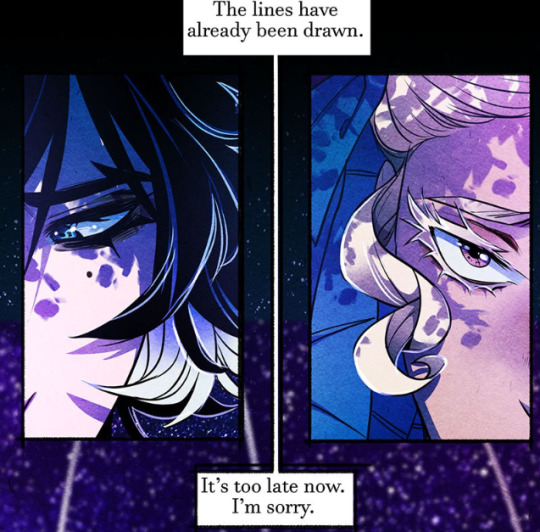
And this:

Annabel refuses to explain to Lenore why the plan has to be the way it is, while Lenore agrees to be part of it (the fact that she disagrees with the whole situation is a plus).
The interesting thing about this is that the roles are reversed: before, Annabel sealed the tragic fate of both of them by accepting Lenore's proposal, while in Nevermore, Lenore sealed the tragic fate of both of them by accepting Annabel's plan.
Another important term that comes up here is hybris. While it is true that hybris represents ego, this does not necessarily mean that the hero is self-centered in a personality sense; hybris is the tragic hero's (misguided, of course) belief that they can turn their terrible situation around. And, well…
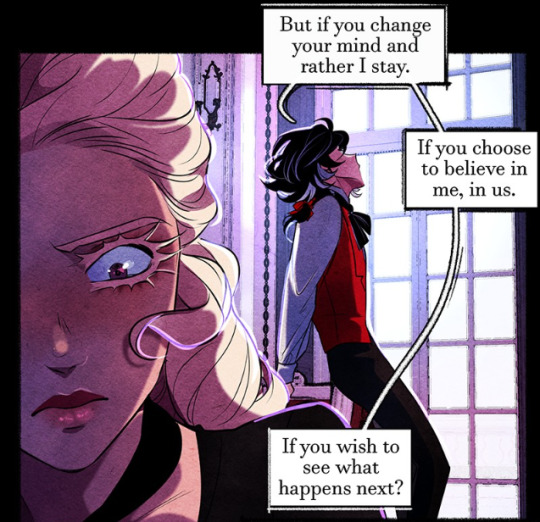
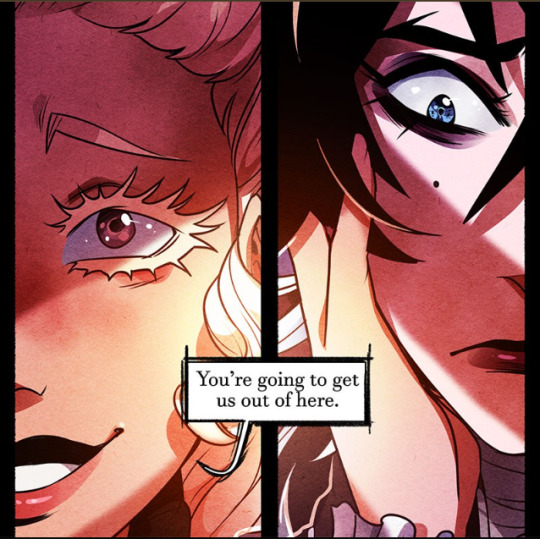
That ends badly in tragedies. Very, very badly.
At this point, it is necessary to start pointing out the elements of each type of tragedy, because something interesting is happening: within the ancient walls of the purgatory that is Nevermore, a classical tragedy is taking place, while in the past, Annabel and Lenore were the protagonists of a Shakespearean tragedy.
Classical Tragedy
One thing to understand about classical tragedy is that these are stories of humanity versus divinity. The predestined fate that comes upon mortals at the hands of beings superior to them, even if those beings do not appear directly. The external forces superior to the characters do not intervene directly (at least not in most cases), but they put all the pieces in place for the tragic hero to fall headlong into his terrible fate "by their own hand". Yeah, that shit is so unfair.
In Nevermore, fate is represented by these two bastards: The Deans act as the ominous shadow of divinity that sets the rules of this battle royale. For all intents and purposes, this pair of bastards represents the tragic fate of the characters: only one will survive to have a second life. And there is (theoretically) no way to escape.
This is where we start to get into thorny issues. If I had to point out the classical tragedy that Nevermore most resembles, I think I'd get a smile out of Hadestown fans: Orpheo and Eurydice.
Okay, let's review: Orpheo is a highly talented musician who, after losing his beloved, goes to the underworld to find her. Hades and Persephone give him a chance to get her back if he doesn't turn around to see her until they leave the place, he does so at the last second, she returns to the underworld, and Orpheus spends the rest of his life in misery mourning her.
That's the thing, the story of Orpheo and Euridice is a tragedy for the most depressing reason of all: love. What seems like a generous gift from Hades and Persephone is actually a condemnation, because they ask Orpheus to do the one thing he could never do: stop looking at his beloved. In some versions of the story, he can't even hear her as they walk; will she really be her, or has he been tricked? Will she be frightened on this journey and he will not be there to comfort her? What if she has trouble on the road or an accident and Orpheus has left her behind? Orpheus loves Eurydice so much that he cannot save her under these circumstances because he cannot stop watching over her long enough to get her out of here.
Now let's go to Annabel and Lenore, the same thing is happening here, these two idiots love each other. It's probably the only thing they know for sure in this bullshit game. And for Annabel and Lenore, to love is to protect, it's to be the shield that will be there to defend their beloved in the face of adversity, she's been hurt in a terrible way and they will do anything to stop anyone from hurting her again.
But tragic fate, represented by the Deans, has set things in motion for this to quickly go to hell:
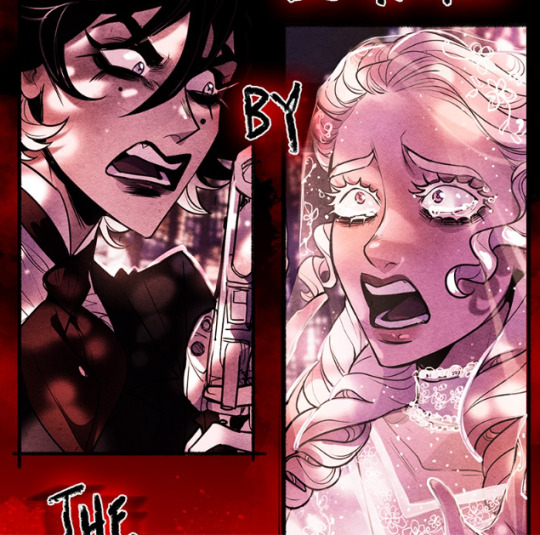
For Lenore to understand Annabel's actions, she would have to tell her that's why she's so afraid, why they shouldn't get attached to anyone, why she thinks it's necessary to pretend they don't remember each other. But Lenore can't be okay with Annabel carrying everything alone, because she sees how it hurts her, because Annabel is clearly hurting. She goes to great lengths to confide in Annabel, but she can't come up with a plausible explanation for all this crap either.
For Annabel, becoming a villain and enduring all this pain is slightly less horrible than dragging Lenore into the Deans' psychotic game. But Lenore just loves her too much to let her do that. Lenore could protect her if Annabel were by her side, so why does she keep leaving? She was hurt the first time, why do it to her a second time?
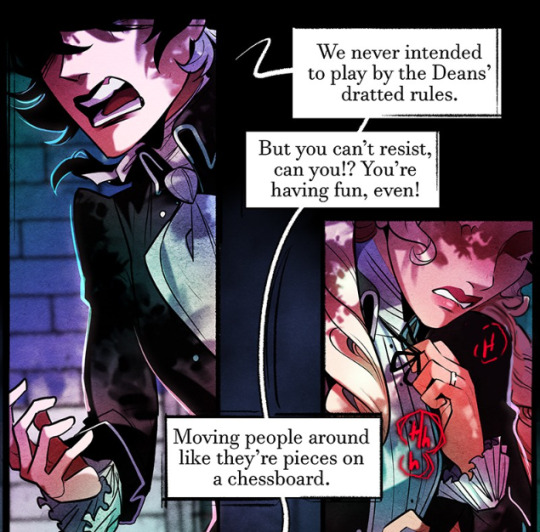

The feeling of not being heard, the frustration that the other just won't listen to her pleas and won't stop what she's doing to allow her to be cared for, runs through both of them because it's the exact same situation, "Why won't you let me do this for you?"
The answer is that Annabel and Lenore are asking the other to do the one thing she could never stop doing: stop trying to protect her. That's why they fight.
This relationship has become a power game that neither can win because they are both exactly the same. A tug-of-war that will only be resolved when something breaks. Hopefully not irreparably.
And speaking of the P-word, let's talk Shakespeare, people.
Shakespearean Tragedy
The good Bard took classical tragedy and brought it back, but changed enough elements of it that it had to be renamed because some of its fundamentals were rewritten. The most notorious of these is that while Shakespeare does not ignore the presence of higher forces or supernatural entities, the fundamental basis of Shakespearean tragedy is not the conflict between humanity and the Fates/Gods.
It is power.
Those who wield power, those who are corrupted by it, and those who crave it. These tragedies speak of moral corruption, the victims of power, and those who sink under the responsibility that power brings.
This is the reason why Shakespeare's tragic heroes belong to the nobility, come from opulent families, or hold important positions. In this case, we have as protagonists two women who were born in a cradle of gold: Lenore apparently comes from a family of old money, and while we do not know if Annabel also comes from a family of old money, we do know that there is no shortage of coins around here.
But status cannot protect Shakespeare's protagonists from the society in which they live, whose agency is sometimes literally represented by people with power. This puts them in a situation from which they cannot escape and which screws them from the start (in other cases the Shakespearean protagonist is the figure of power and seals his own fate). Here, the odds are stacked against them from the start because they are women and, as if that were not enough, lesbians.
I think it's no surprise to anyone that the Shakespearean tragedy most similar to Nevermore is Romeo and Juliet.
Let's review: Romeo and Juliet are two young people who meet at a party and fall madly in love. Their families hate each other, so they cannot be together. The two secretly marry, but after an argument Romeo kills a man and is banished, despite a plan hatched by a priest friend so they can run away together, things go terribly wrong and they both end up committing suicide.
This follows a similar logic to Orpheus and Eurydice: the tragedy here is that these two are in love. But where classical tragedy says, "They love each other so much they can't save themselves," Romeo and Juliet, like Annabel and Lenore, works with two layers of conflict.
The first is the social and political. These young people's families hate each other, so they can't be together. In the same way, Annabel and Lenore can't be together because they're both women.
This is also a reference to one of the central themes of Romeo and Juliet: the clash between tradition and modernity. I think if you squint hard enough, you can see the relationship between these two as Victorian conservatism and homophobia screwing up their lives in the same way that tradition screws up Romeo and Juliet's.
The other layer of the problem is the one that has to do with love: Romeo and Juliet love each other so much that they cannot live without each other. This is what drives them both to suicide, even when they are given the opportunity to continue their lives separately. They love each other so much that they cannot live without each other. Just as Annabel and Lenore desperately want to be together, this is what starts the engine of tragedy when circumstances prevent them from doing so.
Another thing it takes from Romeo and Juliet is the role of the parents as a representation of the power that oppresses the characters. In Romeo and Juliet, the Montague and Capulet lords pull the strings of their children's lives, and it is their resentment that creates the barrier between the lovers. In the case of Nevermore, Ira and Thaddeus are the personal jailers of their respective daughters: Ira wants to get Annabel into an arranged marriage by hook or by crook, and Thaddeus first gets Lenore a fiancé and then keeps her locked up in the fucking attic.
Finally, a tragedy that can be read as a reference to Nevermore, though more subtly, is Macbeth.
The plot is simple: a trio of witches tell Duke Macbeth that he and his descendants will one day be kings. This leads him to murder his cousin, King Duncan, and everything goes downhill from there, because Duncan's murder didn't even amuse the prince.
Yes, at first glance it doesn't seem to make much sense, but that's because it's referring to a specific moment. Specifically, the most discussed and controversial scene in the play: the dialog where Lady Macbeth and Macbeth discuss killing Duncan.
This scene has kept the Bard's fans arguing for centuries: is she manipulating her husband so that she can be queen, or is she just verbalizing Macbeth's wishes that he be allowed to commit the crime, and saying that she will support him in it? Impossible to know unless someone gets a working Ouija board.
This is the same logic that follows the flashback scene where Lenore talks to Annabel about the plan. The important thing here is that the comic decides that the answer is: it depends on who you ask.
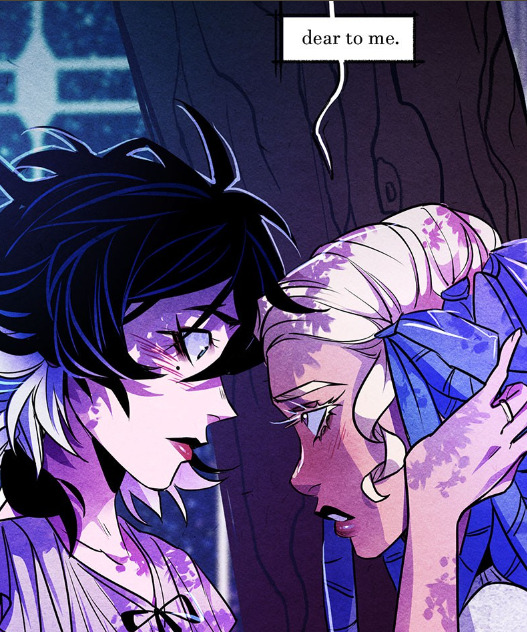
Given Annabel's attitude toward Lenore, we can interpret that she does not think she was manipulated or anything. Lenore is not a devious woman who put things in her head, it was her knight in shining armor who came to save her from a marriage she didn't want. Yes, she may have had her doubts, but she definitely liked her chances, enough to accept them.
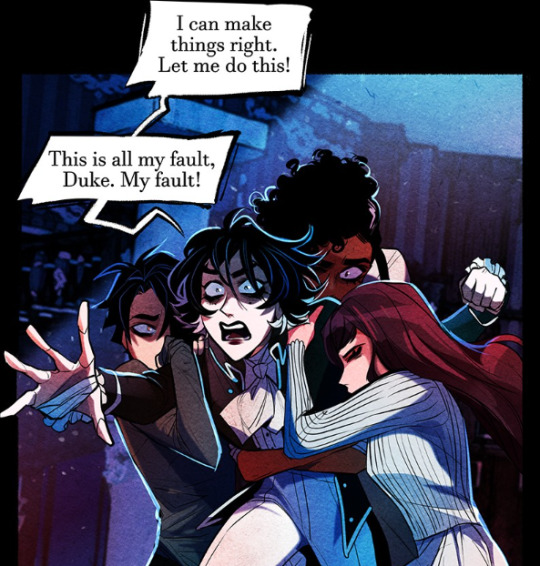
On the other hand, what this tells me is that Lenore thinks the opposite: that she convinced Annabel to be part of this hoax that ended with both of them dead. A crazy woman who dragged the only person she cared about into a dangerous game that cost them their lives, she considers herself as guilty as the perpetrating hand of the crime.
Conclusion
I think the first time I decided to do a review under this particular lens was when I started to notice where Annabel and Lenore's arcs seemed to be going.
On the one hand, given how things are going, it seems that Lenore has to start taking off the blindfold to realize that things aren't as simple as she thinks, and stop letting others make the hard decisions for her because it hurts everyone.
On Annabel's side, you have a character arc that seems to be aimed at being honest with other people, not letting her fears stop her from making risky decisions, and not dealing with all the bullshit herself.
If what I just said leaves a bad taste in your mouth, that's normal. Because it's fucking unfair.
That Lenore should be the one to stand firm - not out of guilt, but out of responsibility - for her actions feels like shit after everything the poor girl has been through. The same thing happens on Annabel's side, that she has to give in to a situation where it makes so much sense for her to shut down, where it makes sense, even without her background, for her to behave that way.
But that sense of injustice is one of the foundations of tragedies. The feeling that, in her situation, it is practically impossible to think that anything different could be done is the basis of catharsis: the pity felt for the character, the fear generated by identifying with their terrible situation.
The expiation of these emotions, which are produced in the spectator by the fall of the tragic hero.
Now, it is interesting to ask how the fall of Annabel and Lenore will be. The simple answer from a tragic point of view is death, a thing we know has already happened once, why not a second time? After all, that's what awaits tragic heroes. Unless you're Medea.
It's impossible to know how the comic will develop, but it seems to me that this is as far as the tragedy goes. For the next part, I want to talk about gothic novels, female vampires, the female writers of the period, and the last gothic. Believe me, buddies, there is no more obsessive romantic bond than that between a Poe protagonist and their dead bride.
#nevermore webtoon#annabel lee nevermore#lenore nevermore#white raven#lenore vandernacht#annabel lee whitlock#annabel lee x lenore#lennabel#nevermore webcomic#nevermore#You know how fucked up it is to realize that in this fucking comic a happy ending would be a plot twist?#I dusted off my notes for this shit#My Shakespeare seminar professor would be proud of me
103 notes
·
View notes
Text
"The ancient view saw little discord between Apollo and Dionysus in shared cuIts in Thebes, Sicilian Naxos, and in the mysteries of Attic Phlya in which Apollo had the title Dionysodotes, Giver of Dionysus, or Saviour, according to the Platonic commentator Olympiodorus.
Both gods appeared side by side in Attic vase painting from the 6th century B.C. In Delphi the dithyramb usually marked the beginning of winter, but on occasion Dionysus could also be praised with the Apolline paean. The 4th century temple divided the honours equally between the two : the east pediment showed Apollo with the Muses and the west Dionysus together with the Thyiades, while a contemporary red- figure vase has both gods cordially shaking hands across the omphalos in the sanctuary."
– Bernard C. Dietrich, "Divine Madness and Conflict at Delphi"
72 notes
·
View notes
Note
any books you recommend for learning about dinoysus and his cults/his role in theater?
The book about theatre which still gets referenced, ancient though it now is, is Dithyramb, Tragedy and Comedy by Pickard-Cambridge. You will find discussions of Dionysus' role here in Seaford's Dionysos, Kerenyi's Dionysos: Archetypal Image, and Otto's Dionysus: Myth and Cult.
A good article which touches on Dionysus and Theatre is:
'Nothing to Do with Dionysus': Tragedy Misconceived as Ritual by Scott Scullion
Lots to study with Bacchae as well, just be aware that what Euripides' wrote in his literature isn't necessarily what actually occurred in cult.
13 notes
·
View notes
Text
The cult of Dionysus in ancient Greece was characterized by a variety of ecstatic ritual practices and festivals that celebrated the god's domain over wine, revelry, and the transformative power of ritual madness. Some of the key rituals and festivals associated with the Dionysian cult included:
The Dionysia Festivals:
- The City Dionysia - Held annually in Athens, this was the most important festival honoring Dionysus. It featured theatrical performances, parades, and sacrifices.
- The Rural Dionysia - Smaller festivals held in rural areas and villages, focused on more rural, agricultural aspects of Dionysian worship.
- The Lenaia - A mid-winter festival celebrated in Athens, featuring dramatic performances and ritual madness.
(Here are just some of them, ofc)

Source.. X (on Lenaia)
Dionysian Mysteries:
- Secret, initiatory rites and rituals practiced by devotees of Dionysus. These often involved altered states of consciousness, ecstatic dancing, and reenactments of mythological events.
- Participants would don masks and costumes to take on the identities of Dionysian figures like maenads (frenzied female followers) and satyrs.
- These rituals were seen as a means of experiencing divine possession and communion with the god.

Dithyrambs and Bacchic Rites:
- Choral hymns and dances performed in honor of Dionysus, often in a frenzied, ecstatic manner.
- Participants would work themselves into a ritual frenzy through chanting, drumming, and drinking wine.
- These rites were closely associated with the mythology of Dionysus and his thiasos (retinue) of satyrs and maenads.

(Source" X - Dionysian Thiasos )
Animal Sacrifice and Sparagmos:
- The ritual tearing apart and consumption of animals, such as goats or bulls, was a key practice in some Dionysian cults.
- This "sparagmos" ritual was seen as a means of communing with the god and experiencing his power.

(Attention, this one is dark.. source).
These are just some of the key ritual practices that were central to the worship of Dionysus in ancient Greece. The cult's emphasis on ecstasy, transformation, and the blurring of boundaries between the divine and human realms was a defining feature of this dynamic religious tradition.
6 notes
·
View notes
Text
Pompe
Taking place during City Dionysia, pompe was the walk to the temple all took part in.
The planning of the festival came down to the Archons of Athens, political leaders. Once elected and planned the festival kicked off.
With the help of two chairs and ten curators the festival began with pompe. All statutes of Dionysus were removed from temples as the polis, metics and representatives marched to the Theatre of Dionysus at Acropolis. This pompe was to re-enact the arrival of Dionysus at Athens.

Along with the statues, this was the time where phalloi were carried, along with water and wine.
Metics and foreigners wore purple robes and carried trays of offerings while citizens wore everyday clothes and carried the water and wine. This is thought to be associated to Dionysus's fashion of reversal of roles. Along with libations, oboloi, long bread, was offered.
Bulls made the procession as well to be sacrificed at the temple. Choregoi, sponsors, wore ornate clothes during the procession.
These sponsors partook in dithyrambic competetions, hymn singing to Dionysus after the pompe. Flute playing and lyrical poetry also took place. After, the bulls were sarcificed and Athenians took part of a feast.
Modern Hellenes can incorporate pompe into practice by taking a walk around local cities or town. One might like to travel to a theatre, as Dionysus is the god of theatre.
#hellenic polytheism#hellenic witch#hellenism#hellenic deities#hellenic polytheistic#hellenic worship#hellenistic#theoi#helpol#dionysus#pompe
16 notes
·
View notes
Text
"The wreckage of stars - I built a world from this wreckage.” - Friedrich Nietzsche, Dithyrambs of Dionysus
52 notes
·
View notes
Text
🍇 Dio(nysus) 🍇
DESCRIPTION
HEIGHT 5’10” normally but can be adjusted at will BODY TYPE svelte, swimmer’s build SEX yes (male but can change this at will) EYES wine-dark…as in a literal merlot color HAIR can be changed at a whim but he’s been rocking the silver fox look
NAME dionysus ALIAS dio theoinos, dio, d, uncle d, etc. AGE ageless and immortal, youngest of the olympians ORIENTATION a bisexual disaster PRONOUNS he/him, but often changes them along with his look, depending on the life he’s leading NATIONALITY greek (?), olympian SPECIES olympian (?), god PROFESSION professional entertainer, ranging from director or actor to small business ownership (vineyards, clubs, or similar) STATUS widowed but prefers to say single MYERS-BRIGGS enfp-t FACECLAIM usually alan cumming - though later i may offer dio’s “other” lives :3c
CHARACTER OVERVIEW
His name is Dionysus. Liber, Bromius, Bacchus too, yes, but always Dionysus first and foremost. God of wine, fertility, excess, ecstasy, theatre, release, rebirth, madness, and the wild joys of total liberation. The original uninhibited god, born of mortal Semele and immortal Zeus, twice-born and full of mirth. The dithyramb is beat in his honor; maneads and bacchants dance in the wild wood for his pleasure. Such is the glory of great Dionysus, madcap lord of the midnight revels.
Well. Such was the glory of Dionysus, lord of the torches. It’s Dio nowdays. Dio Theoinos among the mortal crowds, hot-shot producer/director and King of the Great White Way. (Dɪᴏɴysᴜs is awfully stiff and old-timey, don’t you think? Something a little catchier was in order for the new age.) Unseated from Olympus like the rest of his family when new deities came into power, he’s done pretty well for himself since; he has a handful of accidental cults, a few modern maneads, small businesses in popular cities and the like—nothing spectacular, but certainly enough to get by on. A bit of prayer here and there, a few starving artists looking for a bit of luck, and bam!, he’s back in business. Maybe not running at full capacity, but not exactly putzing around on empty.
Dio is about what you’d expect of him; formerly a blinding force of joy and freedom, he still upholds the right to artistic expression and creativity…it just comes a little more tempered at his advanced age and decreased popularity. He is often surly and unamused, feeling usurped, and while quick to offense, he is equally quick to forgive. Dionysus is a fickle god at best. He loves humanity better than much of his family, but he still views mortals as weak and disposable. Sassy, snarky, witty, and sharp-tongued, Dio spends much of his time among the mortal rabble, and has picked up a few of their habits; but being immortal, he tries not to get too attached.
PERSONAL HISTORY
Available upon request but it is a lot.
Formerly found at @winewomenwit .
6 notes
·
View notes
Text
The Laughing God
His name is Dionysus. Liber, Bromius, Bacchus too, yes, but always Dionysus first and foremost. God of wine, fertility, excess, ecstasy, theatre, release, rebirth, madness, and the wild joys of total liberation. The original uninhibited god, born of mortal Semele and immortal Zeus, aegis-bearer, twice-born and full of mirth. The dithyramb is beat in his honor; maneads and bacchants dance in the wild wood for his pleasures. Such is the glory of great Dionysus, madcap lord of the midnight revels.
—Well. Such was the glory of Dionysus, lord of the torches. It’s Dio nowdays. Dio Theoinos among the mortal crowds, hot-shot producer/director and King of the Great White Way. (Dɪᴏɴysᴜs is awfully stiff and old-timey, don’t you think? Something a little catchier was in order for the new age.) Unseated from Olympus like the rest of his family when the new deities came into power, he’s done pretty well for himself since; he has a big media following, a handful of accidental cults, a few modern maneads—nothing spectacular, but certainly enough to get by on. A bit of prayer here and there, a few starving artists looking for a bit of luck, and bam!, he’s back in business. Maybe not running at full capacity, but not exactly putzing around on empty.
Dio is about what you’d expect of him; formerly a blinding force of joy and freedom, he still upholds the right to artistic expression and creativity…it just comes a little more tempered at his advanced age and decreased popularity. He is often surly and unamused, feeling usurped, and while quick to offense, he is equally quick to forgive. Dionysus is a fickle god at best. Sassy, snarky, witty, and sharp-tongued, Dio spends much of his time among the mortal rabble, and has picked up a few of their habits; but being immortal, he tries not to get too attached.
name: Dio(nysus), Bacchus, Bromius, Liber, Cisseus
alias: Dio Theoinos (usually)
pronouns: he/him (usually)
pantheon: Greek, Roman
familial status: Youngest of the Olympians (two uncles, one father, the Bitch, two aunts, two sisters, a sister-aunt-why are you trying to dissect ancient myth here?, two brothers—it’s actually quite a lot.)
age: Immortal
residence: New York City, New York; Los Angeles, California; Naxos, Greece; Olympus; wherever story demands
martial status: Widowed* Single
orientation: a bisexual disaster
face: Alan Cumming (Dio & most variants)
build: Svelt
height: 5’10” (sometimes up to 6′8″ For Dramatic Effect™️)
hair: Changes with the day. He prefers keeping dark hair or going “distinguished” grey.
eyes: Merlot. (It’s a wine thing.)
postive: philanthropic (…well, to a greater degree than the rest of his family), creative, artistic, loyal, individualistic, (relatively) open-minded, readily accepting, etc.
negative: arrogant, conceited, self-important, self-righteous, pompous, egotistical, narcissistic, fickle, non-committal…the list goes on.
*According to myth, Dionysus married the mortal woman Ariadne of Crete…but, unable to bear the grief of separation from her love, Theseus of Athens, she died. Or ascended to heaven. The story’s a little split on that one. Dio…doesn’t like thinking of himself as “widowed”.
myers-briggs
ENFP: The Campaigner.
extraverted, intuitive, feeling, prospecting, turbulent
Strengths: curious, observant, energetic & enthusiastic, excellent communicator, knows how to relax, very popular & friendly
Weaknesses: poor practical skills, difficulty focusing, overthinks things, gets stressed easily, highly emotional, independent to a fault
moral alignment
Chaotic Good: “The Rebel”
combines a good heart with a free spirit
#; sing o muse (character study)#; late in love and a little drunk (headcanon)#; a new religion (blog mythos)
2 notes
·
View notes
Note
Fic authors self rec! When you get this, reply with your favorite five fics that you've written, then pass on to at least five other writers. Let’s spread the self-love 💕💗
(Sending this back your way because I didn't see if you already answered! 💖)
hellooo to this ancient ask from months ago! Which I'm pinging @she-who-drank-vodka-with-cats who also sent me this ask recently. Anyway most of this is Witcher fic but not all!
Ouroboros - Vilgefortz/Geralt but mostly Vilgefortz. 20k. TWN but blended the fuck into everything else. What else can I say that I haven’t nattered about in my tag already. It has art history and porn, dark shit, unnecessary Vilgefortz backstory, lots and metaphor and symbolism. Illusions and inverting moments from book scenes and going on tangents might have actually come together by the end of the fic.
Stories we tell, memories we share and the words we hold dear - TWN. Geralt/Jaskier, post canon, 28k. Aka the story I rewrote 3 times and is soft old men in love and probably the thing I'm most proud of in addition to it being my favorite. Romance and acts of service, disabled characters. With too much worldbuilding. Poetry and storytelling and lots and lots more nostalgia, softness, and puns. Geralt loves Jaskier and Jaskier loves Geralt.
Heart Tap - TWN, Leshen Eskel/Geralt. More a character study but still quite slashy. I really really love this story and need to write more of this series. I’m still obsessed with the idea of a witcher turned into a monster and losing his mind and trying to figure out who he is now and how he fits in at Kaer Morhen and if he can still even be a witcher. And Eskel likely being able to see between different worlds/canons. Just really exploring his memory issues and identity. Also tree sex with Geralt, okay. I started it for the tree nonsense and everything else just happened. Non-witcher fic: Dawn of the Dithyramb, Greek Mythology. Apollo/Dionysus. Humor/crack/porn. ~4k words. It’s been a billion years since I wrote this but I’m still quite fond of this silly horniness with Greek gods, playing with structure and it’s very fun and smutty and silly.
rejocing in virility, Satan/Beezlebub. John Milton’s Paradise Lost. 458 words. Poetry. A handjob in mid-air and me running with Milton's way of using catalog for pornographic effect. This was in fact for a class assignment and my professor read it aloud to my class and no one really listened closely enough to understand their professor was reciting a santanic handjob to them. Truly a pinnacle classroom experience for me.
#aka my list of I Have Always Been Like This as a writer i guess#but yes these are my most favorites of favorites and very special to me#answerdora#fic meme#writing#writing meme#kuwdora's favorites#my witcher fic#my fic
3 notes
·
View notes
Text
The origins of the ancient Greek drama
”Aristotle is known to have attributed the origin of Greek drama to the worship of Dionysus and the singing of Dithyrambic Odes, which admittedly, plays a big part in Greek Tragedy in 5th century Athens. However, the origin of Tragedy actually probably belongs to the worship of dead heroes, like Adrastus. F. B. Jevons points out that Herodotus reports that tragic choruses were preformed over Adrastus’ death. Meanwhile, Jevons also makes the vital point that masks were “never worn in the performances of the dithyrambic chorus” and as he says quite beautifully, “Masks and acting in Greece were inseparable; there was no acting without masks, and there were no masks without acting”. However, for the sake of being thorough, all origins of Greek tragedy, including dithyrambs, will be discussed.
Epic poetry not only provided a basis for the kind of stories tragedy would deal with, it also provided the format for language in which these stories would be told. The iambic form was discovered in the epics of The Illiad and The Odyssey and continued long into Tragedy.
Dithyrambs provide the first link to Dionysus and performance. These were odes sung to honor the god, and can be seen used by a tragic chorus in Euripides’ The Bacchae. The comedic versions of these songs, called “phallic songs” can be called the origins of comedy. Both of these songs were the beginning of the separation of leader from chorus, which is later separated even further.
These forms transformed into the Satyr plays which are often comedic and have masked Satyr chorus. Satyr plays were, of course, continued as an actual form and were present in all Great Dionysia festivals.
Finally, as Aristotle explains “it was only at a late stage that tragedy attained dignity by departing from the style of satyr-plays”. Tragedy and Comedy eventually came into being on their own. Tragedy was “gradually enhanced” as the poets changed it. Aristotle attributes the increase of actors from one to two to Aeschylus and the increase to three, as well as scene painting, to Sophocles. Thespis,where we get our modern word "thespian" introduced the use of masks. Whether or not these elements can actually be attributed to these playwrights is impossible to know, however tragedy did evolve this way and, as Aristotle puts it “when it had gone through many changes, tragedy ceased to evolve, since it had attained its natural fulfillment”. While, this is perhaps an overstatement, there is no doubt that the Greek Tragic plays of the 5th century BC were indeed some of the greatest writing, from one of the greatest civilizations the world has ever seen.”

Source: https://www.brown.edu/Departments/Joukowsky_Institute/courses/13things/7415.html (the site of the Joukowsky Institute for Archaeology & the Ancient World, Brown University)
2 notes
·
View notes
Text
How theatre started? 🎭
The origins of theatre can be traced back to Ancient Greece, where during ancient festivals the god Dionysus was honoured and revered through the singing of hymns called dithyrambs. Dionysus was initially a symbol of fertility for the Greeks, later described as the god of the wine grapevine, and eventually became the patron of poetry and theatre. Sacred rites praising him were held twice a year – those that took place in cities were called the Great Dionysia, while those in rural areas were known as the Lesser Dionysia. In Greek, "tragedy" means "song of the goats," while comedy is "song of the reveling procession," which perfectly reflects the essence of celebrating the figure of Dionysus.
0 notes
Text
Lord Byron ~~~ Childe Harold
peri - Persian winged spirit
mote - might
whilome - formerly
wight - a creature
hight - named
losel - worthless person
ay - always
eremite - hermit
aught - anything
Paphian - of or pertaining to Paphos, an ancient city of Cyprus sacred to Aphrodite; of or pertaining to love, esp. illicit sexual love; erotic; wanton.
leman - sweetheart
feere - consort, spouse
paynim - a non-Christian, especially a Muslim
sea-mew - sea gull
anon - soon
surtout - a man's greatcoat of a similar style to a frock coat
shent - put to shame
lath - a thin flat strip of wood
ween - think
hind - peasant
roundelay - short, simple song with a refrain
orison - a prayer
rapine - the violent seizure of someone's property
rebeck - medieval stringed instrument
wittol - a man who is aware and tolerant of his wife's infidelity
poniard - a small, slim dagger
falchion - medieval European sword
mantle (vb) - spread like a mantle (especially of blood in the face and cheeks when a person flushes)
kibe - an ulcerated chilblain, especially one on the heel
croupe - horse’s rump
courser - a swift horse
brast - burst
conynge
to brook - to allow or accept something, esp. a difference of opinion or intention
sable - black; dark, gloomy
Bactrian sage - Zoroaster
Samian sage - Pythagoras
Caledonia - the Latin name used by the Roman Empire to refer to the part of Great Britain (Latin: Britannia) that lies north of the River Forth, which includes most of the land area of Scotland
rive - split or tear apart violently
reeve - to pass (something, such as a rope) through a hole or opening
balk - hesitate or be unwilling to accept an idea or undertaking
featly - in a graceful manner : nimbly; with skill and ingenuity
Arion - semilegendary Greek poet and musician of Methymna in Lesbos. He is said to have invented the dithyramb (choral poem or chant performed at the festival of Dionysus)
fell - a high barren field or moor
aread/ared - make known, declare
Caloyers - Greek monks who followed the rule of Saint Basil
capote - a long cloak or coat with a hood, worn especially as part of an army or company uniform
Dodona - Dodona in Epirus in northwestern Greece was the oldest Hellenic oracle, possibly dating to the 2nd millennium BCE
santon - Muslim monk or hermit, according to Europeans
glaive - European polearm, consisting of a single-edged blade on the end of a pole
palikar - Greek or Albanian soldier in the pay of the sultan of Turkey
camese - type of shirt
carle - peasant
Giaour - a non-Muslim, especially a Christian
reave/reft - carry out raids in order to plunder
pibroch - a form of music for the Scottish bagpipes involving elaborate variations on a theme, typically of a martial or funerary character
bruit - spread (a report or rumour) widely
guerdon - a reward or recompense
bucentaur - the ceremonial barge of the doges of Venice
lauwine - avalanche
Candia - name for Crete under Venetian rule
Tully - Cicero
Tarpeian Rock - a steep cliff on the south side of the Capitoline Hill, which was used in Ancient Rome as a site of execution
nympholepsy - passion aroused in men by beautiful young girls; wild frenzy caused by desire for an unattainable ideal
upas - poisonous Asian tree
immedicable - unable to be healed or treated; incurable
Euxine - Black Sea
Symplegades or Clashing Rocks - also known as the Cyanean Rocks, were, according to Greek mythology, a pair of rocks at the Bosphorus that clashed together whenever a vessel went through. They were defeated by Jason and the Argonauts
fain - pleased, willing
0 notes
Text
Heya, so I'm writing part 3 right now. But before publishing it, I just realized that I have more things to say about part 2 (so you have the opportunity to discover/rediscover it before the next segment).
So... part 2 DLC.
Dionysus and animals :

While talking about him as a god of nature, I explained his link to vegetation but completely forgot about animals ! That's a shame because there's a lot to say about that too.
As a god of wilderness, it's only natural for Dionysus to share a bond with animals (heck, a lot of gods had symbolic animals). His are :
The maenads: just kidding. They're more dangerous than animals 😂. Here's the real list.
The panther/leopard : the main animal we associate to him, the wild and exotic predator. He ambushes his preys, hides and follows them until they feel confident enough then STRIKES. Yes, this is Dionysus' method too. In general, Dionysus is big on felines (lions and tigers too, though less commonly used)

Yes. This right here is a human head. I bet it's Pentheus' 😂
Bulls : this animal seems to have an important role in mythology. This association is present in the Bacchae for exp, where Pentheus sees his bull horns, for exp. What I love about that symbolism is how it links him to Zeus, since they both share it, but also to Ariadne (through the Minotaur). Maybe even to Hera.
Of course, not every myth about bulls relate to any of these examples (Helios for exp, unless we see the link with his daughter Pasiphae and the cretan bull or Apollo maybe...
I think those are mere coincidences. And associating this instance to Dionysus would be stretching too far. Let's not overanalyze it either).
Btw, art showing Dionysus with horns is so cool !! (shoutout to @margaretkart for drawing it and @nysus-temple for making a whole mini-petition about it. Btw, if you see any false statements in my essay, feel free to call me out. I'll remove them).
Dolphins : the tyrrhenian pirates that dared to kidnap the god, who transformed them into dolphins... at least, those that had the time to jump in the sea. The master/captain, and maybe others, was EATEN by Dionysus while he took the form of a lion. What's funny is that this is probably Dionysus' "nicest" punishments because no one was turned insane, at least not for very long (stay tuned for part 3)

Snakes : let's talk a bit about orphism. According to the tradition, Zeus slept with Persephone as a serpent and from this union, Zagreus was born. For the few that wouldn't know, Zagreus is basically Dionysus' previous life.
Snakes also show up in other stories. According to the Bacchae, Zeus gave Dionysus a crown of snakes in his birth. Coupled with orphism, this basically solidifies Zagreus' "second birth" (third if we count Semele and Zeus as separate "bearers"). The new beginning of the snake god.
Snakes appear in other myths, including against the tyrhennian pirates (yes, he unleashed havoc on that ship XD)
Goats : this one is shorter. Goats show up a LOT sporadically.
Little addition to the theater part : "Tragedy" means "goat song", in reference to it's role in ritual sacrifices (btw, dithyramb, a form of ancient poem, is also associated to Dionysus' myths, about "two doors" in his life, Semele and then Zeus' thigh).
Anyways, goats are a part of his epithets (goat-kid, goat-shooter or goat-skinned), of his companions the satyrs and of this little trivia...
I feel like the goat is Dionysus' "fleeing" form. He used it as Zagreus to flee the Titans (and failed). Later, as he was hiding him from Hera, Zeus made him take the form of a baby goat. Once again conntecting orphism and more widespread myths.
I love when things connect together !
See ya in part 3, when things will get spooky for Halloween !
Dionysus' iceberg (part 2)
Here's part 1 :
Yes, I know, I took my time with this one 😅. But part 2 is finally here on Tumblr !
And, since there's a lot to say about Dionysus, I'll probably need to do a third one... yes he's that interesting.
In this part, I'll talk about Dionysus' connections to theater, nature and vegetation.
1. Theater 🎭
Despite Apollo being the god of the arts, theater is one of Dionysus' domains.
In fact, his theatre (in Athens) is considered the first in the world! Dionysus is like an entertainer, not only through parties, but also through a performance on the stage.

Okay, more seriously: one of his festivals, the Dionysia, even had five days dedicated to drama. In fact, theater plays are said to be set in competitions honoring Dionysus himself.
This festival in and of itself is quite complex, as it's divided in two categories (rural and city festivals) and has quite a history. So, I'd highly recommend reading more about it.
Even the idea of theater masks come from there ! They were parts of disguises actors (always men) wore to play the roles of women or gods.
I'm gonna stop a bit with the informations to talk about two interesting things :
It's actually really cool that the god of theater is a good actor.
I say that because he managed to fool Pentheus and a WHOLE pirate crew into thinking he's some inoffensive boy. And then, dramatic plot twist : he's not.
Another cool thing : he appeared both in a comedy and tragedy. Probably in other lost plays too. It's part of his duality, which I'll talk about more in part 3.
Anyways, ancient Greek theater, the ancestor of our modern plays, is very closely tied to Dionysus.
2. His link to satyrs

This bearded man is Silenus, son of Hermes and one of the satyrs. The baby he's holding is an infant Dionysus, who was forced to go in hiding because of Hera's wrath.
Edit : forgot to complete this part. So, Silenus is considered Dionysus' tutor, kinda like Chiron and Asclepius, but wilder.
Like Dionysus, he appears to be a funny drunkard, but in reality, he can be very wise too. Heck, he even has some prophecy powers when intoxicated. How cool is that ? I like this little duality.
He notably appears in Midas' myth. Silenus was found by peasants and given to the king. Since Midas took good care of him and showed a lot of hospitality, Dionysus decided to reward him. And we all know how the story goes at that point.
Another important satyr (in the Dionysiaca, for example) is Ampelos/Ampelus. He was a young satyr who could very well be Dionysus' first love. What's so interesting about him is that, after his death (R.I.P), Dionysus transformed him into the first grape vine 🍇 !
(this time, not a flower, unlike Hyacinthus and Crocus).
Yes, if you drink wine, you're technically drinking Ampelos' blood.
In general, the satyrs, along with the maenads, are Dionysus' companions. We all know what satyrs are, but it's not surprising to see two symbols of sexuality, drunkenness and wilderness so closely tied.
Also, coming back to theater, there was something called "satyr plays", a mix between tragedy and comedy that were played during the Dionysian festival.
3. A god of nature and vegetation
There are many other nature gods. They each show their connection to nature in their own unique way.
Of course, there's wine and grapes (and Ampelos), but also a lot more stuff.
Dionysus was said to live his youth on Mount Nysa, in the nature, among nymphs and other satyrs. So those ties would come from very early on in his life.
He's not only the god of grapes, but fruits and plant life in general. It's interesting to see the same domains shared by multiple gods (here with Demeter).
The multiple water and wind gods are another proof of that.
And yes, he can grow vines as much as he pleases, like when he punished the thyranean pirates.
4. A fertility god
Yeah, don't listen to LO, male fertility gods exist too 😂.
He's not even the only one, since there's Priapus as well. And he's often (not always) considered his son, with Aphrodite as the mother.
It's honestly not surprising to see a god of nature and fruits, but also one known for his orgies, being associated with fertility.
There aren't many myths about it, so I'll just include that one because it's interesting.
So...
I went through these informations pretty quickly, in order to keep this post at a normal length. I'd love to see you complete on these particular aspects.
In part 3, I'll talk about Dionysus' duality, but also his link to madness, mortals (like Semele and Ariadne), and other gods.
Part 3 will be the longest, since I'll include a lot more references (to myths like the war against India, the Bacchae and more infos about his cult and stories)
#dionysus' iceberg#dionysus#dionysos#greek mythology#greek myth discussion#rant#not a reblog#i tagged the “dionysus specialists” here 😛. nysus made very interesting essays about him that I invite you to read
42 notes
·
View notes